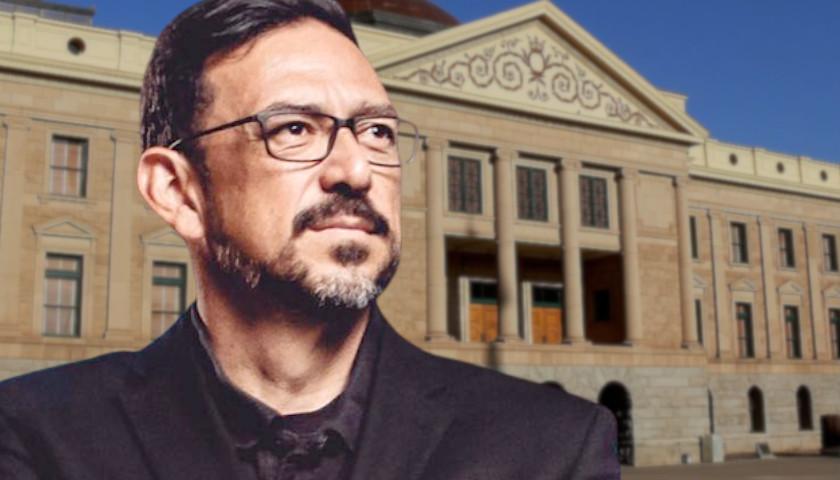Democratic Arizona Secretary of State (AZSOS) Adrian Fontes started sending proposed draft revisions of parts of the state’s Election Procedures Manual (EPM) to county recorders around the state.
Jennifer Wright, who served as the Election Integrity Unit civil attorney under former Arizona Attorney General Mark Brnovich, where she was extensively involved in reviewing then-Secretary of State Katie Hobbs’ proposed changes to the EPM, said she believes several of the first round of proposed changes would violate the law.
Wright told The Arizona Sun Times that “the EPM is only intended to provide uniform instructions to counties on how to effectuate their statutory responsibilities, not create criminal penalties to voters. See A.R.S. 16-452.”
Fontes (pictured above) proposed adding two new definitions for what constitutes harassment at the polls. The first is “Following voters or poll workers coming to or leaving a voting location, including to or from their vehicles.” The second expands “Directly confronting” and “questioning” poll workers or voters to also include “photographing, or videotaping voters or poll workers in a harassing or intimidating manner, including when the voter or poll worker is coming to or leaving the polling location.”
Wright said, “The EPM was not designed to create criminal laws as to voters.To the extent that it has ever attempted to do so, it likely has never been legally enforceable. Further, there are also serious constitutional issues with these new rules. The EPM cannot abrogate the constitutional rights of voters.”
She explained, “This also seems to potentially criminalize ordinary electioneering that has been protected by the US Supreme Court. For instance, a campaign worker in a MAGA hat or alternatively a BLM hat standing outside a polling location passing out palm cards and greeting voters could be construed by some as ‘confronting,’ ‘harassing’ and/or ‘intimidating.’”
Next, Fontes proposed a requirement for ballot instructions to “provide the voter instructions on how to make their intent clear if they inadvertently mark the target area for a candidate or ballot measure and want to correct their vote and/or instruct the voter to contact the county recorder to request a new ballot to ensure their vote is not processed as an overvote.”
However, Wright told The Sun Times, “This would appear to violate the plain language of 16-621(B)(2) and was expressly rejected by Ariz. Pub. Integrity Alliance v. Fontes.”
That statute gives the authority to determine voter intent to a bipartisan board, not a conversation between the country recorder and the voter afterward.
Maricopa County Elections has come under criticism for talking to voters who called about their provisional ballots and not asking for adequate proof of their identification. A.R.S. 621(B)(2) provides, “The board of supervisors or officer in charge of elections shall appoint an electronic vote adjudication board that consists of two judges who are overseen by an inspector, with the two judges equally divided between the two largest political parties as prescribed by section 16-531, subsection D to adjudicate and submit for tabulation a ballot that is read by the tabulation machine as blank in order to determine if voter intent is clear on a portion or all of the ballot, or any portion of any ballot as prescribed by section 16-610 or 16-611, or to tally write-in choices as prescribed by section 16-612.”
Fontes proposed language that would allow unmonitored ballot drop-off boxes.
Wright said this violates A.R.S. 16-1005(E), and the Arizona Supreme Court has ruled that the EPM cannot conflict with state laws.
A.R.S. 16-1005(E) states that ballot drop-off sites must be “staffed.” It provides, “A person or entity that knowingly solicits the collection of voted or unvoted ballots by misrepresenting itself as an election official or as an official ballot repository or is found to be serving as a ballot drop off site, other than those established and staffed by election officials, is guilty of a class 5 felony.”
Fontes’ proposed language states, “Counties may provide for staffed curbside or drive-through ballot drop-off options at any early, emergency, or Election Day voting location or as otherwise approved by the Board of Supervisors.”
Another change by Fontes’ proposed removing the line instructing recorders to consult other signatures on file when conducting signature verification. His suggested change deletes this line: “In addition to the voter registration form, the County Recorder should also consult additional known signatures from other official election documents in the voter’s registration record, such as signature rosters or early ballot/PEVL request forms, in determining whether the signature on the early ballot affidavit was made by the same person who is registered to vote.”
Wright, who is involved in litigation contesting Abe Hamadeh’s election loss in the attorney general’s race, declined to comment about the change other than to “note that this is the subject of litigation in both the Lake case and the Arizona Free Enterprise Club v. Fontes.”
In those cases, the plaintiffs are challenging the newer practice of Maricopa County Elections signature reviewers to only compare voter affidavit signatures to the voters’ most recent signatures on file, since there were concerns that some of the most recent signatures were fraudulent signatures since they did not match previous signatures.
Fontes proposed changing the language that requires election officials to increase the number of polling locations to reduce the wait times, making it optional instead.
However, Wright warned that this isn’t a good change considering the lengthy wait times voters encountered in Maricopa County during the general election.
She told The Sun Times, “Arizona law requires the SOS to create allowable wait time procedures and methods to reduce wait times. See A.R.S. 16-411(J). Because these specific methods of reduction are not statutorily delineated, the Secretary is free to make the shall a may. However, it seems counter to the statutory purpose of both 16-411(J) and 16-452 to have ambiguous requirements especially after wait times in Maricopa County in 2022 well exceeded the EPM’s 30 minute maximum wait time.”
Another addition by Fontes would require mail-in ballots to be available for every election.
Wright said the statute he cited does not require that, so “will likely be considered an unfunded mandate that cannot be issued in the EPM without legislative appropriation.”
Fontes’ proposed language states, “Any election in Arizona must provide for early voting, which includes no-excuse ballot-by-mail A.R.S. § 16-541. 1 voting and in-person early voting.”
Finally, Fontes deleted the entire section containing standards for voting equipment certification.
Wright noted that while the AZSOS is required by A.R.S. 16-442(C) to adopt standards for this, they are not required to be in the EPM.
“Previous secretaries included the standards as an appendix to the EPM,” she said.
The AZSOS is required by law to update the EPM every other year, but due to Hobbs refusing to make changes to her draft EPM that Brnovich required of her, the state has been using the 2019 version.
– – –
Rachel Alexander is a reporter at The Arizona Sun Times and The Star News Network. Follow Rachel on Twitter. Email tips to [email protected].
Photo “Adrian Fontes” by Adrian Fontes. Background Photo “Arizona Capitol” by Wars. CC BY-SA 3.0.





